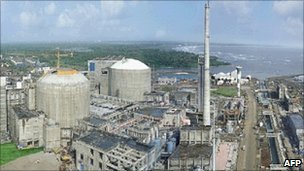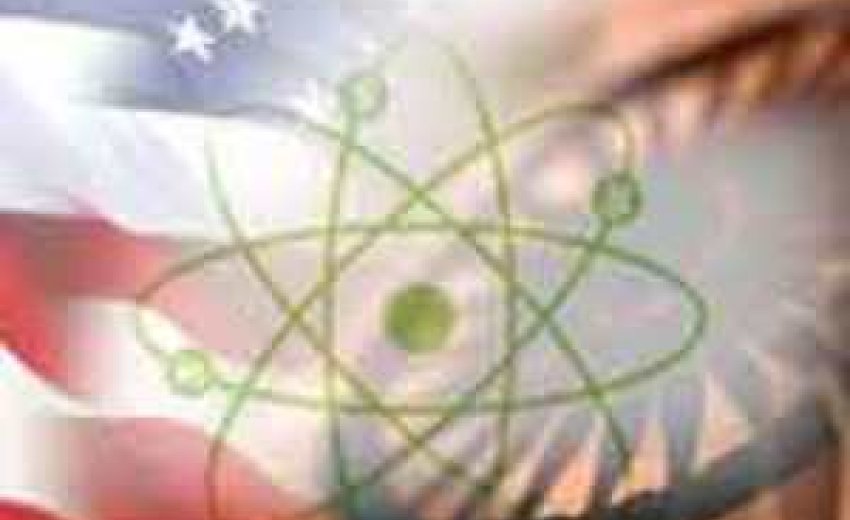 Aug. 20, 2010: India's cabinet has approved a controversial draft law aimed at opening up its civilian nuclear power industry to private investment.
Aug. 20, 2010: India's cabinet has approved a controversial draft law aimed at opening up its civilian nuclear power industry to private investment.
It came after the government dropped an addition to the bill which opposition parties said would limit the liability of companies in case of accidents.
The law sets out a framework for how any compensation claim will be managed.
The bill will now be introduced in parliament, where it is expected to be passed easily.
"After the bill is passed in parliament we will enter a series of negotiations for the purchase of equipment and we will see actual contracts being signed," Prithviraj Chavan, junior minister for science and technology, said.
The bill was approved after the authorities agreed to triple the compensation cap in the event of a nuclear accident to 15bn rupees ($322m; £207m).
The bill is part of a landmark agreement with the US in 2008 which granted India access to foreign nuclear technology.
But some private firms, especially in the US, have been reluctant to set up nuclear power plants in India without a law that would limit their liability.
 |
| Tarapur Atomic Power Station in India's Maharashtra state At present, nuclear energy provides only 3% of India's energy needs |
The contribution of nuclear energy is now expected to rise from its current level of a mere 3% as India embarks on a substantial expansion of nuclear power reactors over the next few decades.
Kolhapur, Aug 23-OneIndia News: Bharatiya Janatha Party (BJP) leaders told that the party will not allow United Progressive Alliance (UPA) government to work under United States pressure.
BJP senior leader Gopinath Munde told during concluding session of Maharashtra BJP's executive meet that BJP won't allow the bill to be passed since its Opposition is in majority in Rajya Sabha.
BJP opposed the amendments in the crucial Nuclear Liability Bill, that provides for compensation in case of a nuclear accident.
The proposed amendment says: “Provided that the central government may, by notification, assume full liability for a nuclear installation not operated by it if it is of the opinion that it is necessary in public interest.”
This means that the government, looking into the future, agrees to handle compensation for victims of a nuclear accident even if the operator is someone other than the government.
The opposition parties also opposed the amendment suggested to Clause 17 in the Bill, which dilutes the liability of the supplier of nuclear technology.
Different media reported that opposition parties will again combine to fight against amendments in the Nuclear Liability Bill.
|
As the cabinet finally clears the Nuclear Liability Bill, we look at a timeline of the bill, its controversial liability clause and the consequent changes New Delhi: For US private companies involved in nuclear commerce, to come to India, it is necessary to pass the Civil Liability for Nuclear Damage Bill, also known as Nuclear Liability Bill. In case a nuclear accident occurs, the bill defines the financial and legal liabilities upon the involved groups — manufacturers, operators and the government. The bill is faced with opposition in India because the original draft had capped liability at about $110 million, rather less than international conventions. With the backdrop of the Bhopal Gas Tragedy, India is especially sensitive towards things such as compensation and other legalities in case of an accident. The opposition from the BJP and Left Parties led the government to set up a panel to examine the bill, which eventually suggested that the liability cap on the operator be fixed at $320 million. The government is keen on ratifying the bill and smoothing entry for global firms. A timeline of the bill follows: October 2008: India, US sign 123 Agreement. Then external affairs minister Pranab Mukherjee and US secretary of state Condoleezza Rice put the final seal on the agreement paving the way for entry of American companies into the Indian nuclear market. read story January 2009: Intense lobbying begins for the $160 billion nuclear business pie that India offers. US and India hold high-level discussions to explore business opportunities. read more November 2009: US companies like GE plan to build nuclear power plants in India, following the landmark agreement. read story March 2010: The bill sparks debate in India. By seeking to shield foreign reactor builders from the weight of the financial consequences of severe accidents, the Bill shifts the main burden for accident liability from the foreign supplier to the Indian taxpayer. read more 15 March 2010: Th bill was supposed to be introduced in Parliament, but the government backs off as the opposition parties protest over the limited liability that energy firms would face in case of accidents. read more 12 April 2010: Prime Minister Manmohan Singh met US President Barack Obama and discussed the controversial bill. Officials said that Singh informed Obama that the nuclear liability bill is going through democratic processes. read story 12 August 2010: UPA decides to re-examine the bill. The parliamentary standing committee on science and technology, headed by Congress lawmaker T Subbarami Reddy, to come up with report in two days. read story 18 August 2010: Parliamentary panel recommended the liability cap be trebled to $320 million. The recommendations meant higher costs for firms such as General Electric and Westinghouse Electric, which would have to pay higher insurance premiums. read story 20 August 2010: Cabinet clears nuclear liability bill. It is likely to be placed in parliament tomorrow. |
